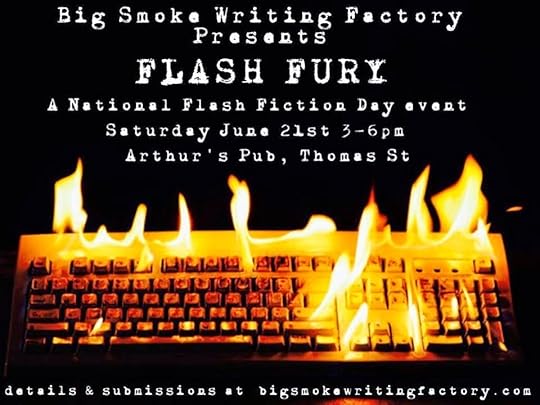Nuala Ní Chonchúir's Blog, page 33
June 22, 2014
FEEDBACK & FLOATINESS

I've had enormous freedom last week and this. Having no Penguin deadline is now my version of freedom. I do have an article to write. And a review. I've an interview to compose and a conference and a couple of festivals to prep for but, with no immediate Penguin deadline, I feel FREE!
So I have been reading. Some research bits for Novel #4, but mostly for pleasure. I am grazing between Mary O'Donnell's tense and insightful novel Where They Lie, a fabulous Daniel Woodrell collection, Dubliners 100 from Tramp Press and my friend Billie Travalini's memoir Blood Sisters. And I feel floaty and positive because there is no insane urgency to anything. I am reading more, walking more, thinking more, and just being more than I have in ages.
And I am managing to feel floaty despite the tension that review-waiting causes. Yes, Closet has had some reviews and they've been good, but I have been told there are more to come so I buy the papers at the weekend and hold my breath until I see whether there is one or not. And though there has been a paucity of reviews in the last few weeks, I have been getting reader feedback. Enthused, warm-hearted feedback from friends, real and virtual. And it makes me think, Who needs reviews when you get long texts and emails that detail tears shed over the book, characters loved, appreciation for language/style/setting etc? There is little better than that direct connection with readers.
People may think that writers receive feedback and/or praise all the time, or that we don't value it. They may think that we understand our own work deeply and know how it will affect readers. Let me tell you, we don't. And we rarely hear genuine feedback and we always appreciate when people take the time to offer it. ALWAYS.
So thanks, lovely readers, for buying the book in the first place, and for reading it and for taking the time to think about it and for letting me know your thoughts. Thanks for the Facebook pics of you reading it in exotic locations and for equating it with your experiences in ways that were beyond me as I wrote the story. A million thank yous - I am humbled and honoured by your effort and commitment.
Published on June 22, 2014 13:05
June 20, 2014
HAPPY FLASH FICTION DAY!!
Happy (International) Flash Fiction Day!
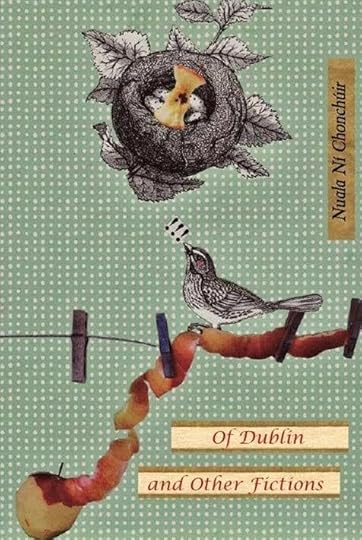
I am delighted that my flash chapbook Of Dublin and Other Fictions has received a good review from Kelly Creighton, in New Zealand based journal Flash Frontier. A sample: 'Each fiction is a fresh one: a balance of truth and the surreal. The author makes us laugh (out loud) when we are not expecting to. Anyone who writes flash fiction should read this book; it should be taught! Ní Chonchúir makes brief look effortless, but this is her expertise.' The full review is here.
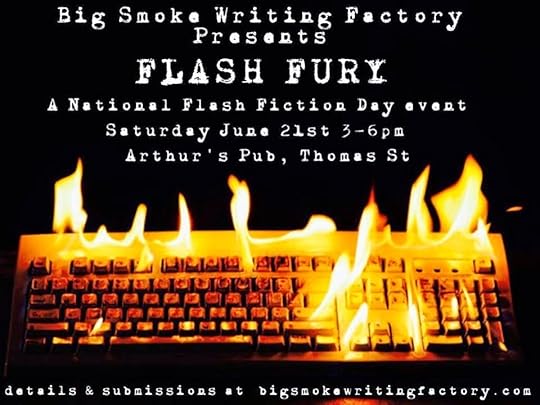
From 3pm to 6pm today I will be in Arthur's Pub on Thomas Street in Dublin for the Big Smoke Writing Factory's annual flash event. This year: Flash Fury! I'll be reading along with many others and also announcing the winner of the 99 word flash prize. I would love to catch up with some of you there.
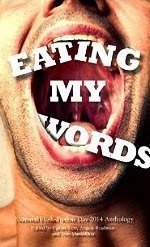
I also have a flash called 'Cider and Simnel' in the NFFD anthology, Eating My Words. Which can be bought in paperback at £6.99 or for Kindle at £1.99. Lots of good stuff in there from writers like Tania Hershman, Eabha Rose, Nik Perring, Nigel McLoughlin, Cathy Bryant, Tim Stevenson and Jonathan Pinnock.

I am delighted that my flash chapbook Of Dublin and Other Fictions has received a good review from Kelly Creighton, in New Zealand based journal Flash Frontier. A sample: 'Each fiction is a fresh one: a balance of truth and the surreal. The author makes us laugh (out loud) when we are not expecting to. Anyone who writes flash fiction should read this book; it should be taught! Ní Chonchúir makes brief look effortless, but this is her expertise.' The full review is here.

From 3pm to 6pm today I will be in Arthur's Pub on Thomas Street in Dublin for the Big Smoke Writing Factory's annual flash event. This year: Flash Fury! I'll be reading along with many others and also announcing the winner of the 99 word flash prize. I would love to catch up with some of you there.

I also have a flash called 'Cider and Simnel' in the NFFD anthology, Eating My Words. Which can be bought in paperback at £6.99 or for Kindle at £1.99. Lots of good stuff in there from writers like Tania Hershman, Eabha Rose, Nik Perring, Nigel McLoughlin, Cathy Bryant, Tim Stevenson and Jonathan Pinnock.
Published on June 20, 2014 23:00
June 19, 2014
FIRST PUBLIC READING IN MY HOMETOWN
I have my first public reading in my hometown in Palmerstown, Dublin, on next Wednesday the 25th June. I get to share a panel with my sister Aoife O'Connor (editor of
Small Lives
) and, believe it or not, also with my deceased sister, Nessa O'Connor (author of
Palmerstown: An Ancient Place
). Well, 'share' in the sense that Nessa's book will be honoured. Anyway, I am 11 years a-publishing so this feels rather overdue...
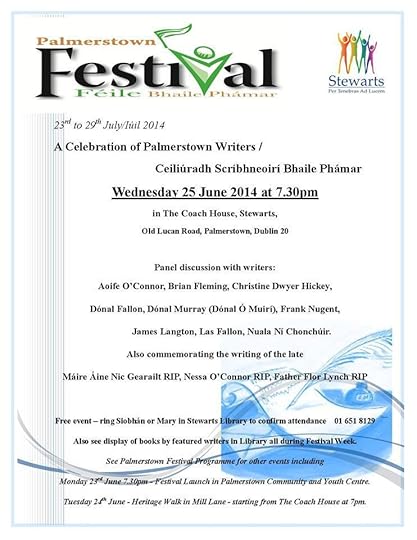

Published on June 19, 2014 23:00
June 18, 2014
NOVEL #4 - EEK!
I am at the start of a new project and my heart is lodged in my throat. I am arguing back and forth with myself: Am I able for this? Is it wise to take this on? How am I going to write it anyway - from whose POV? In what voice? Do I even want to write this book? Is it going to collapse on me?
None of these questions are answerable but they are with me constantly. I know they are just 'the voices', the ones that try to convince me that I am fooling myself but they are hard to quieten, even after all this time, experience, several books published etc.
I'm daunted, terrified and not even one bit hopeful. Yet. Well, I am hoping that I get there, that I suddenly know what it is I want to do with this story and that I can do it.
I am going start with an attempt to be more organised this time by keeping really accurate research notes, all in one place, instead of in five different notebooks and on hundreds of discardable A5 pages. That way, at the editing stage (see, hope despite myself!) I will have good notes to consult.
'Writing,' says Camille Paglia, 'is a strange process of anxiety crowned by pleasure.' Fingers, toes and everything crossed as I open page one of a new notebook and begin.
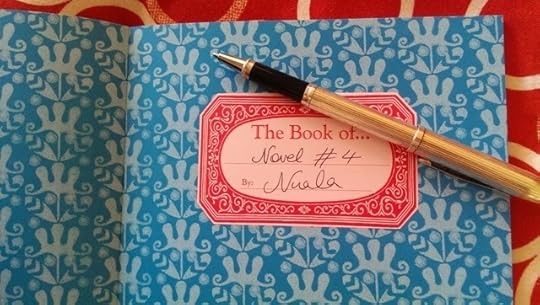
None of these questions are answerable but they are with me constantly. I know they are just 'the voices', the ones that try to convince me that I am fooling myself but they are hard to quieten, even after all this time, experience, several books published etc.
I'm daunted, terrified and not even one bit hopeful. Yet. Well, I am hoping that I get there, that I suddenly know what it is I want to do with this story and that I can do it.
I am going start with an attempt to be more organised this time by keeping really accurate research notes, all in one place, instead of in five different notebooks and on hundreds of discardable A5 pages. That way, at the editing stage (see, hope despite myself!) I will have good notes to consult.
'Writing,' says Camille Paglia, 'is a strange process of anxiety crowned by pleasure.' Fingers, toes and everything crossed as I open page one of a new notebook and begin.

Published on June 18, 2014 23:15
June 17, 2014
FLASH FURY FOR IFFD
Published on June 17, 2014 23:00
June 16, 2014
TIN JUG RESIDENCY FOR WRITERS
Writers' Residency WeekTin Jug Studio, Birr, County Offaly, October 2014 Applications are sought for a new Writers' Residency based in County Offaly. This residency in the Georgian town of Birr offers an opportunity for professional writers to take a short break from daily routines and focus on their writing. It is aimed at those who feel the need to re-invigorate themselves and work towards the completion of current work or for writers who simply need inspiration, through a change of place and stimuli.
The bursary includes one week's accommodation in one of the period rooms of the guest house with breakfast and evening communal supper.
The residency bursary is open to professional published writers of any genre such as literary fiction, poetry, playwrights, journalism or travel writing. There are three places available for newly published or experienced writers from across the 32 counties.
Application Requirements: A short outline of why you would like to (or need to) spend a relaxing and inspiring week of writing in BirrFull CVSample copies of published work.Applications are preferred in hard copy (so as to include samples of published work). Please send your applications to:
Rosalind Fanning Saint Brendan Street, Birr, County Offaly
Applications may also be accepted by email, with appropriate links to published work and enquires are welcome to info@tinjugstudio.com
Deadline for applications: Monday 30th June, 5.00pm
The bursary includes one week's accommodation in one of the period rooms of the guest house with breakfast and evening communal supper.
The residency bursary is open to professional published writers of any genre such as literary fiction, poetry, playwrights, journalism or travel writing. There are three places available for newly published or experienced writers from across the 32 counties.
Application Requirements: A short outline of why you would like to (or need to) spend a relaxing and inspiring week of writing in BirrFull CVSample copies of published work.Applications are preferred in hard copy (so as to include samples of published work). Please send your applications to:
Rosalind Fanning Saint Brendan Street, Birr, County Offaly
Applications may also be accepted by email, with appropriate links to published work and enquires are welcome to info@tinjugstudio.com
Deadline for applications: Monday 30th June, 5.00pm
Published on June 16, 2014 23:00
HAPPY BLOOMSDAY!
Happy Bloomsday, everyone!!
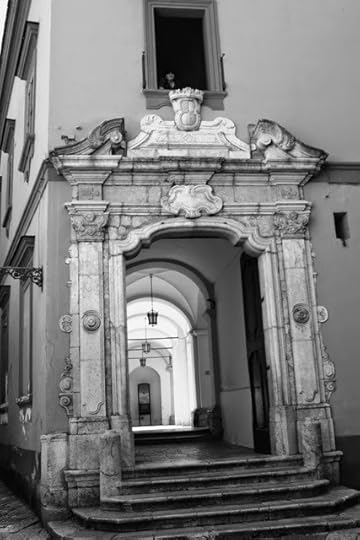 Woman at window, Sant' Agata dei Goti, ItalyI am back at my Ballinasloe desk after a spell in Italy (see the Italo-Irish Literature Exchange blog for reports and photos on that, from me and my companions).
Woman at window, Sant' Agata dei Goti, ItalyI am back at my Ballinasloe desk after a spell in Italy (see the Italo-Irish Literature Exchange blog for reports and photos on that, from me and my companions).
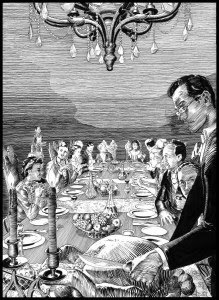 One of Robert Berry's Joyce illustrationsAnd, latterly, I was at the ACIS conference in UCD, catching up with American friends and listening to papers on topics as diverse as Twitter poetry, and the ways in which museums present social histories. I also caught a Paula Meehan reading and a book launch. All pretty wonderful. I have been attending a lot of Irish Studies Conferences here and abroad in the past few years, without even realising it; I always learn things at them and the people I meet are invariably brilliant and friendly.
One of Robert Berry's Joyce illustrationsAnd, latterly, I was at the ACIS conference in UCD, catching up with American friends and listening to papers on topics as diverse as Twitter poetry, and the ways in which museums present social histories. I also caught a Paula Meehan reading and a book launch. All pretty wonderful. I have been attending a lot of Irish Studies Conferences here and abroad in the past few years, without even realising it; I always learn things at them and the people I meet are invariably brilliant and friendly.
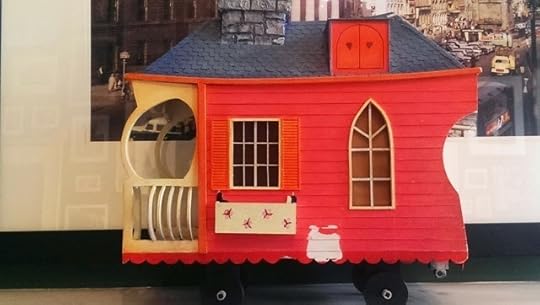 Scale model of Wanderly Wagon at the Little Museum of DublinIt was great to be in my hometown for a few days without the usual obligations; I ate out a lot and went to pubs and even managed some Joyce-related outings: a visit to Sweny's; a leisurely seaside wander in Dalkey (in still, heavy summer air - I am loving this heatwave!), and an exhibition of Robert Berry’s hand drawn ink illustrations of ‘The Dead’ in the extraordinary Little Museum of Dublin. If you haven't yet visited that museum, I urge you to go: it's the right side of eccentric and also totally absorbing.
Scale model of Wanderly Wagon at the Little Museum of DublinIt was great to be in my hometown for a few days without the usual obligations; I ate out a lot and went to pubs and even managed some Joyce-related outings: a visit to Sweny's; a leisurely seaside wander in Dalkey (in still, heavy summer air - I am loving this heatwave!), and an exhibition of Robert Berry’s hand drawn ink illustrations of ‘The Dead’ in the extraordinary Little Museum of Dublin. If you haven't yet visited that museum, I urge you to go: it's the right side of eccentric and also totally absorbing.
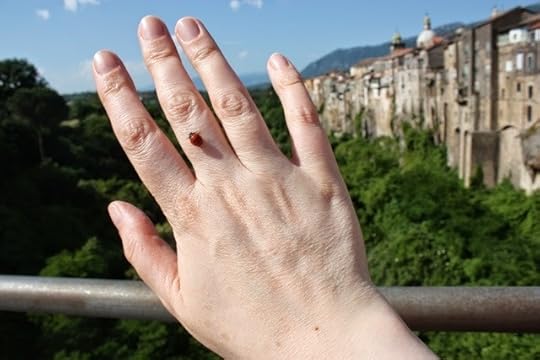 CoccinellaI met this little one in Italy, in Sant' Agata dei Goti. Ladybirds are my favourite creatures and she just flew in and landed on my hand. I took her as a good omen for my Emily Dickinson book which went into production in the States while I was in Italy. Nervous excitement!!
CoccinellaI met this little one in Italy, in Sant' Agata dei Goti. Ladybirds are my favourite creatures and she just flew in and landed on my hand. I took her as a good omen for my Emily Dickinson book which went into production in the States while I was in Italy. Nervous excitement!!
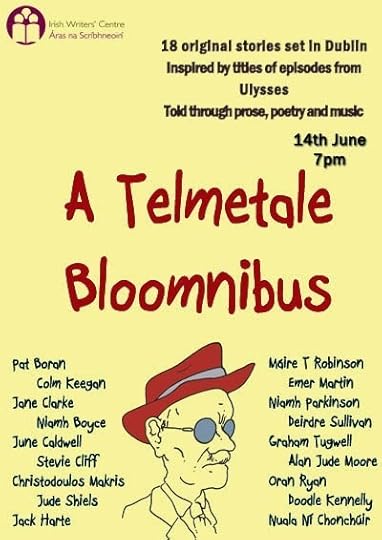
If you fancy a bit of Joyce today, you can buy Ulysses digitally for tuppence-hapenny (36p in 'new' money). Or you could plump for the rewritten version A Telmetale Bloomnibus for the rather more steep in comparison, but still bargainous, Stg £1.99.
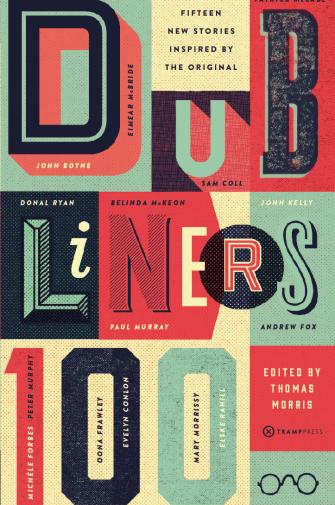
Or you could try Dubliners 100, just out from Tramp Press, which I bought in UCD. I have only read Thomas Morris's introduction but so far, so good.
Whatever your Bloomsday brings, if you can't be in Dublin, think of strolling its streets in the beautiful June heat - in good company - and all will be well :)
 Woman at window, Sant' Agata dei Goti, ItalyI am back at my Ballinasloe desk after a spell in Italy (see the Italo-Irish Literature Exchange blog for reports and photos on that, from me and my companions).
Woman at window, Sant' Agata dei Goti, ItalyI am back at my Ballinasloe desk after a spell in Italy (see the Italo-Irish Literature Exchange blog for reports and photos on that, from me and my companions). One of Robert Berry's Joyce illustrationsAnd, latterly, I was at the ACIS conference in UCD, catching up with American friends and listening to papers on topics as diverse as Twitter poetry, and the ways in which museums present social histories. I also caught a Paula Meehan reading and a book launch. All pretty wonderful. I have been attending a lot of Irish Studies Conferences here and abroad in the past few years, without even realising it; I always learn things at them and the people I meet are invariably brilliant and friendly.
One of Robert Berry's Joyce illustrationsAnd, latterly, I was at the ACIS conference in UCD, catching up with American friends and listening to papers on topics as diverse as Twitter poetry, and the ways in which museums present social histories. I also caught a Paula Meehan reading and a book launch. All pretty wonderful. I have been attending a lot of Irish Studies Conferences here and abroad in the past few years, without even realising it; I always learn things at them and the people I meet are invariably brilliant and friendly. Scale model of Wanderly Wagon at the Little Museum of DublinIt was great to be in my hometown for a few days without the usual obligations; I ate out a lot and went to pubs and even managed some Joyce-related outings: a visit to Sweny's; a leisurely seaside wander in Dalkey (in still, heavy summer air - I am loving this heatwave!), and an exhibition of Robert Berry’s hand drawn ink illustrations of ‘The Dead’ in the extraordinary Little Museum of Dublin. If you haven't yet visited that museum, I urge you to go: it's the right side of eccentric and also totally absorbing.
Scale model of Wanderly Wagon at the Little Museum of DublinIt was great to be in my hometown for a few days without the usual obligations; I ate out a lot and went to pubs and even managed some Joyce-related outings: a visit to Sweny's; a leisurely seaside wander in Dalkey (in still, heavy summer air - I am loving this heatwave!), and an exhibition of Robert Berry’s hand drawn ink illustrations of ‘The Dead’ in the extraordinary Little Museum of Dublin. If you haven't yet visited that museum, I urge you to go: it's the right side of eccentric and also totally absorbing. CoccinellaI met this little one in Italy, in Sant' Agata dei Goti. Ladybirds are my favourite creatures and she just flew in and landed on my hand. I took her as a good omen for my Emily Dickinson book which went into production in the States while I was in Italy. Nervous excitement!!
CoccinellaI met this little one in Italy, in Sant' Agata dei Goti. Ladybirds are my favourite creatures and she just flew in and landed on my hand. I took her as a good omen for my Emily Dickinson book which went into production in the States while I was in Italy. Nervous excitement!!
If you fancy a bit of Joyce today, you can buy Ulysses digitally for tuppence-hapenny (36p in 'new' money). Or you could plump for the rewritten version A Telmetale Bloomnibus for the rather more steep in comparison, but still bargainous, Stg £1.99.

Or you could try Dubliners 100, just out from Tramp Press, which I bought in UCD. I have only read Thomas Morris's introduction but so far, so good.
Whatever your Bloomsday brings, if you can't be in Dublin, think of strolling its streets in the beautiful June heat - in good company - and all will be well :)
Published on June 16, 2014 00:57
June 2, 2014
LIA MILLS INTERVIEW
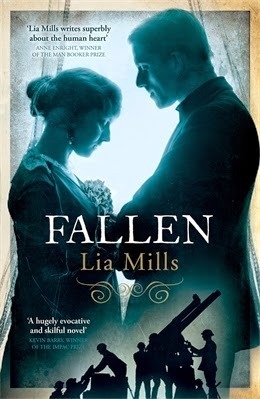
Dublin author Lia Mills’ third novel Fallen is out this Thursday from Penguin Ireland. It is a beautifully written narrative about grief, sister-love, loyalty, and family and its uneven nature.
Katie Crilly’s beloved twin brother Liam is killed on the Western Front. While trying to come to terms with her loss, Katie is confronted with a very real war on her own doorstep, as well as the internal war in her family precipitated by Liam’s death.
Anne Enright says, 'Lia Mills writes superbly about the human heart.' And so she does. I'm honoured to have Lia here at my blog ahead of publication day.
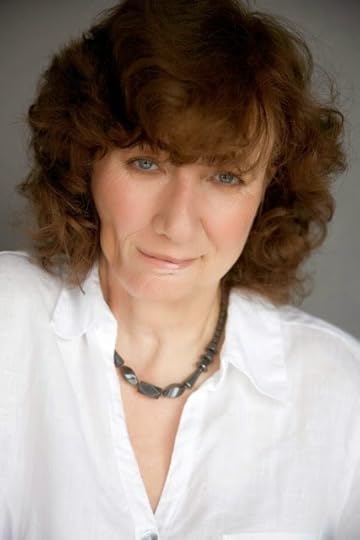 Lia Mills - portrait by Mark McCallWelcome, Lia. Fallen is set in a Dublin which is being convulsed by the Easter Rising while in Europe WW1 is also taking place. What attracted you to this time period?
Lia Mills - portrait by Mark McCallWelcome, Lia. Fallen is set in a Dublin which is being convulsed by the Easter Rising while in Europe WW1 is also taking place. What attracted you to this time period?In a former life, I did a lot of research into the literary and social history of that period, it’s fascinating. It was a time when Irish men and women seemed to be intensely alive and engaged, looking forward as well as back, eager for change … My interest was in re-discovering forgotten Irish women writers. It’s strange – no matter how often we ‘discover’ the role of women in civic and artistic life at that time, the impression doesn’t seem able to get traction in the public mind. We have the Rosie Hackett bridge now, and that’s great, but it’s depressing to hear young people say we must find out more, now that we’ve learned about these women we mustn’t forget … it’s like reinventing the wheel every time.
The Rising is our version of a foundation myth. It’s a brilliant story, with all the right ingredients: the few against the many, the brave against the powerful, thrilling speeches from the dock and across open graves, romance, betrayal, sacrifice. As I was growing up I loved the story, what child wouldn’t? But it bothered me that the city of Dublin – my city – got bad press. As usual.
I used to think my family had nothing to do with the Rising because my parents were of that ‘Whatever you say, say nothing’ generation. Then I realized that both sets of grandparents were living and working right on the edge of the fighting: my mother’s family on Parnell Street, with the Briitsh Army camped outside their door; my father’s family on Merrion Row, with the British Army camped outside THEIR door. I began to ask myself what that must have been like, when all hell breaks loose on the streets of your city and you don’t know what’s going on or where it will end. The novel is set in the past but it’s a relevant, contemporary question.
For me it was wonderful to see the Rising from the POV of a young woman, Katie Crilly. It gave a fascinating view of both the events and of Dublin. In fact, female relationships are to the fore in the story as a whole. Was it important to you to have a female protagonist? Talk to me about her friends, Dote and May – are they based on real activists of the time?
Katie was there from the beginning. Liam and Hubie came later but in many ways it’s their story as much as hers. She’s the one who gets to tell it, but Liam’s voice comes through in letters and Hubie talks a lot.
A lot of women lived together then, as Dote and May do. It was a way of getting out from under their families without giving scandal, and of pooling scant resources. They’re not based on any particular women, but Dote is linked to the suffrage movement, for example, while May’s family is more Anglo, with a military tradition and links to India etc. There are real historical figures in the novel, but they only have walk-on parts.
There is a great sense of Dublin being taken over in the novel; of the weirdness and menace that that entailed. What form did the research take for that very vivid, threatening atmosphere in the city?
That started in Paris!! It was the strangest thing. I was plodding along with a draft, but it was quite sterile and I was unhappy about it when I arrived in Paris to start a residency in the CCI. My arrival coincided with the anniversary of the liberation of Paris and everywhere I looked there were plaques and memorials and flowers to named individuals and events. Remembering the wars seemed part of the fabric of the city and it jolted me out of my complacent sense of the Rising as a neat, almost clinical event with a logical and proper outcome. I spent my time in Paris wandering around graveyards, looking at memorials and reading about Irishmen who fought in the Great War and getting angry on their behalf. Furious, actually. The artist Gail Ritchie was there at the same time, and she was working on memorials too. We spent hours talking about history’s many forms of amnesia. So you could say that the graveyards of Paris started it.
That’s when I found the novel’s pulse. For research I read – a lot. Contemporaneous accounts, historical accounts of the war and the Rising; contemporaneous novels for a sense of how people used language. I went to the Imperial War Museum in London and read original diaries and letters. I spent a fair amount of time in Collins Barracks, too. And there’s a brilliant WWI website: http://firstworldwar.com/ But I also spent time walking around Dublin, visiting sites that feature in the novel (and plenty that don’t feature in it any more). I spent a lot of time looking at photos of the period – two books I’d recommend are Christiaan Corlett’s Darkest Dublin and Catriona Crowe’s Dublin, 1911. The National Library has a fantastic collection online as well: http://www.nli.ie/
Do you enjoy research?
A little too much. Research is the guilty secret of this kind of writing. You’re stalking a subject through time. It’s like the hours you lose following a thread online, but a lot more fun. The thrill of the hunt, of finding something fresh, sparks new connections in your mind and sets all your synapses popping ... it could go on forever. That’s the problem. At some point you have to call a halt. In the end I’d accumulated too many details and impressions, they threatened to choke the novel to death. You have to know when to stop and that’s never been my strong point, with anything.
There are some gorgeous details in the book. For instance a weird and wonderful insight into the Wellington Monument which I am dying to know if you invented or if it’s true. I was also fascinated by Paschal the monkey who looms large in the book and provides levity from the difficult events taking place. Where did he come from?
Someone told me the Wellington Monument story years ago and it stuck. I don’t actually know whether it’s true or if it’s an urban legend, or a myth-trap for tourists. There are other rumours about it – a secret staircase inside, a vault, a haunting. I didn’t care whether it was true or not, the story was too good to waste. The way Dote tells it, it’s not entirely clear whether she believes it herself. It’s a test, for Katie. Paschal is a bit of a test too. As soon as he appeared I knew I had to have him. People did keep monkeys as pets – One of my mother’s sisters once told me that my mother had been immune to my father’s charms until he gave her a monkey to win her over – Paschal became something of a touchstone in the novel; he represents something vital in Katie. You can tell a lot about the characters by how they respond to him.
Katie meets Liam’s war buddy Hubie and from him she learns more about her brother and about the realities of being on the Front. Their dealings with each other are at once spiky and warm. They are two strong-minded but also, at this period, needy characters; was it tricky to find a balance in writing their relationship?
Is it balanced? I’m not sure. They are both quite difficult, each in their own way, but the more difficult they became the more real they were. They are both damaged. The question of how to live is acute for both of them. I don’t want to say too much here. I don’t mean to be coy, but I don’t want to give too much away, either.
Historian and author Clare Wright spoke recently about ‘The Dick Table’ – the space in book shops given over to men’s books, usually non-fiction about ‘male’ topics (war, sports etc.). She has written a book about goldfields and says it does not appear on The Dick Table purely because she is a woman (she moves it there!). You have written about The Rising and WW1. Do you think it likely your book will be positioned beside, say, Sebastian Barry et al? Would you like it to be? (Link here to article).
The Dick Table? That’s brilliant. I suppose we’ll have the Mick Table next? I want Fallen to be wherever readers will find it. I could say that I’d like it to be near the cash register, but people would disapprove and think I’m shallow and grasping so maybe I won’t say that. Oops. But it IS a very real issue. Someone should start a survey like the VIDA statistics, charting how books are positioned in shops and how sales are affected. My last book, In Your Face, was a memoir of illness and I don’t think any two bookshops had it stocked in the same category. In some it was shelved under Health, others had it in Self-Help and one had it with the New Age books. No one could ever find it!
You write non-fiction as well as novels. How do you find the writing of memoir vs novels? Which is your preferred form?
I write short stories too. It depends on the story, and the context: what’s the most effective way to tell it – or to explore an idea? Memoir is easier because you don’t have to make anything up. But then you have ethics (and sometimes legalities) to deal with.
Why do you write?
It’s a physiological thing for me, like breathing. It’s the best way I know to experience what it is to be alive in the world, to be human. If that sounds grandiose I’m sorry, it’s just the truth. I don’t mean that I think everyone should write, or even that I think writing is any better or any worse than other things that people do with their lives, I just know that it’s my thing and I have to do it.
A more moderate reason is that I’ve been an obsessive reader from a very young age. The world behind the lines was absolutely real to me then and still is.
What is your writing process – morning or night – longhand or laptop?
Sometimes I think I’m writing all the time, even when I’m asleep – I get great ideas and solutions in the middle of the night. I keep a notebook by the bed and scribble in the dark. It’s annoying when you wake up and see that you forgot to turn the page and the best idea you’ve ever had has been completely overwritten and you’ve no-one but yourself to blame. Writing has different phases, too – it’s more varied than people realise. And there’s a surprising amount of admin. I teach as well, which is fun but time-consuming, with recurring deadlines that have a horrible knack of coinciding with times when your need to immerse yourself in your own fugue is at its most intense. My best writing time is very early in the morning. I’m a bit insomniac, and instead of fighting it I like to get up early and start to work before anyone else is awake. But the dogged hours I put in later can be productive too. What often happens is that I’m getting ready to quit for the day but if I make myself stay on and just try to loosen one single knot, something unexpected will open up and I get a few extra hours.
I move between laptop and desktop and I always have a notebook on the go.
Who are your favourite women writers and why?
Oh god, I really hate this question. Partly because I never know where to start or where to stop. I owe so many writers of both sexes a debt of gratitude for hours of pleasure or flashes of insight, I could go on all day and mean every word. Another reason I hate the question is that so many of my friends are good writers – seriously good, world-class writers, but it feels a little incestuous to say so. So I leave my generation of Irish women out of these appraisals, with apologies.
I tend to love individual books rather than writers, if you know what I mean. For example, I’m not mad about her fiction but I truly love and still enjoy Virginia Woolf’s A Room of One’s Own. Edna O’Brien, for A Pagan Place. Tillie Olsen, for Silences. Fay Weldon. Margaret Atwood. Toni Morrison. Muriel Spark. Molly Keane’s late novels. Clare Boylan’s Holy Pictures. AS Byatt’s Possession. Elizabeth Strout. Hilary Mantel. Janet Malcolm’s non-fiction. Claire Tomalin’s biographies. Sylvia Plath. Katherine Mansfield, Flannery O’Connor, Lorrie Moore, Deborah Eisenberg. Mavis Gallant. Isak Dinesen. Joyce Carol Oates & Lydia Davis … See what I mean? Someone has to stop me.
What one piece of advice would you offer beginning writers?
Choose it. Just step up and begin. Do it – and keep practising until it becomes so much a part of you that you can’t imagine not doing it. I wish I’d known this one simple thing years ago, I’d have saved myself a lot of grief and wasted time. If it’s what you want but you’re doing other things instead, ask yourself why and how to change it. This is your real, your actual life you are living, it’s not a trial run. If there’s something you want to do, then it’s up to you to make the move and do it, otherwise it won’t get done. It’s as simple – and as hard – as that.
What are you working on now?
I’ve been working on short pieces since Fallen left my desk last October. I’m enjoying the rhythm of finish, send, move on; finish, send, move on – it’s good for the soul after the years that Fallen took to finish. The rights of my last novel, Nothing Simple, reverted to me last year and I’ve decided to reissue it as an e-book. The process of getting it ready has been instructive. It’ll be available online soon. And I took part in a playwright mentoring programme with Fishamble at the Pavilion Theatre in Dun Laoghaire this year – it’s winding down now, we had a Showcase performance, of short plays and extracts, last week. Now I need to finish writing the play. I’m working on a commission to write a short story for DLRCC, and there are other short pieces lined up behind that one. The blog has been active recently too. A question I need to get to grips with is: given the amount of time it takes, is the blog justified? Oh, and I’ve been teaching on the MFA in Creative Writing Course in UCD, so I’m reading a lot and meeting students to give feedback – that goes on through the summer. Meanwhile, I’m sifting through ideas for the next long project, which I hope to start in October.
Wishing you all the luck (and sales) in the world with Fallen, Lia. It’s a beautiful, insightful novel. Readers, you can buy it here.
Thanks a million, Nuala. And I’m looking forward to your own next novel, Miss Emily – do you have a publication date for it yet?
Oh, a question for me! Yes, June 2015 for Miss Emily, all going well. Final draft went to Penguin on Sunday. Yay!
Published on June 02, 2014 23:00
LISTOWEL AFTERS & PICS
Between preparing for the Italy trip (more of which on the Italo-Irish Literature Exchange blog), and a final, final edit for Penguin, I have been distractedly busy. I hardly took any photos in Listowel - I was too busy teaching, eating and attending events. But, for what it's worth, here are my pictures. Most taken on my phone, so not great quality...
It was a great few days of short story blather at my workshop with a lovely group of 13 people (mostly men, unusually). I went to two launches - firstly Mary O'Donnell's novel Where They Lie was launched by John Mac Kenna in the library. The book is fab - I have started it and it's beautifully well written and intriguing.
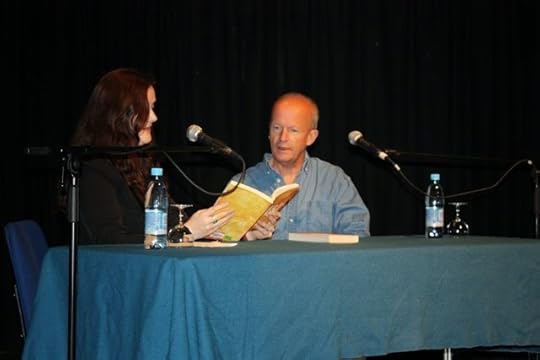 Me and Jim CraceI interviewed English writer Jim Crace, author of Man Booker shortlisted novel, Harvest, in St John's. He was fluent, interesting, honest and friendly. The book is brilliant - flawless in language and tension.
Me and Jim CraceI interviewed English writer Jim Crace, author of Man Booker shortlisted novel, Harvest, in St John's. He was fluent, interesting, honest and friendly. The book is brilliant - flawless in language and tension.
 Authors John Mac Kenna and Mary O'DonnellJohn Mac Kenna's novel Clare, was launched by Mary O'Donnell (synchronicity!) in the Boys' School on Friday afternoon. John read beautifully and spoke movingly about the life of John Clare, the 19th C poet.
Authors John Mac Kenna and Mary O'DonnellJohn Mac Kenna's novel Clare, was launched by Mary O'Donnell (synchronicity!) in the Boys' School on Friday afternoon. John read beautifully and spoke movingly about the life of John Clare, the 19th C poet.
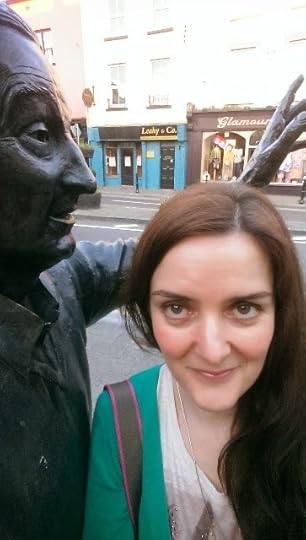 John B. Keane and meOtherwise, we bumped into friends, real and virtual - Paul Durcan was the first person I met when we arrived at the hotel (lovely Paul!). I had delicious rhubarb and orange crumble in John R's café. Juno refused to chat with Anne Enright (of all people...). I went to hear Douglas Kennedy discuss narrative in life and fiction. And Juno very much enjoyed Sarah Webb's morning of children's games.
John B. Keane and meOtherwise, we bumped into friends, real and virtual - Paul Durcan was the first person I met when we arrived at the hotel (lovely Paul!). I had delicious rhubarb and orange crumble in John R's café. Juno refused to chat with Anne Enright (of all people...). I went to hear Douglas Kennedy discuss narrative in life and fiction. And Juno very much enjoyed Sarah Webb's morning of children's games.
And, because I was teaching, I didn't stay up for the all night sessions of music and drink, so I may have missed out a bit on the night-time conviviality. But, no matter, I had a fabulous time; the sun shone and the town was packed with enthusiastic readers and writers, making for a sweet atmosphere. All thanks to Eilish Wren, Máire Logue and the Listowel committee.
 Juno in front of a little house - Listowel is chock full of interesting, native architecture
Juno in front of a little house - Listowel is chock full of interesting, native architecture

 The view from the back of The Listowel Arms, the hotel where we stayed
The view from the back of The Listowel Arms, the hotel where we stayed
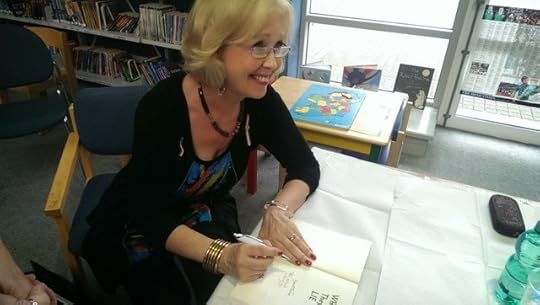 Mary O'Donnell signing at her launch
Mary O'Donnell signing at her launch
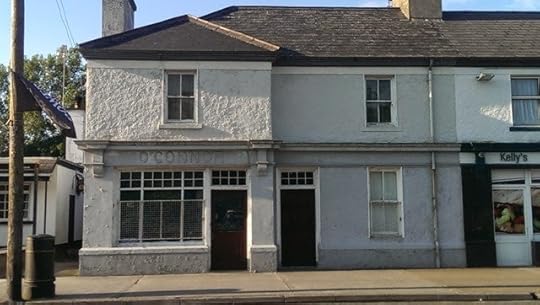 O'Connor's in Foynes
O'Connor's in Foynes
It was a great few days of short story blather at my workshop with a lovely group of 13 people (mostly men, unusually). I went to two launches - firstly Mary O'Donnell's novel Where They Lie was launched by John Mac Kenna in the library. The book is fab - I have started it and it's beautifully well written and intriguing.
 Me and Jim CraceI interviewed English writer Jim Crace, author of Man Booker shortlisted novel, Harvest, in St John's. He was fluent, interesting, honest and friendly. The book is brilliant - flawless in language and tension.
Me and Jim CraceI interviewed English writer Jim Crace, author of Man Booker shortlisted novel, Harvest, in St John's. He was fluent, interesting, honest and friendly. The book is brilliant - flawless in language and tension. Authors John Mac Kenna and Mary O'DonnellJohn Mac Kenna's novel Clare, was launched by Mary O'Donnell (synchronicity!) in the Boys' School on Friday afternoon. John read beautifully and spoke movingly about the life of John Clare, the 19th C poet.
Authors John Mac Kenna and Mary O'DonnellJohn Mac Kenna's novel Clare, was launched by Mary O'Donnell (synchronicity!) in the Boys' School on Friday afternoon. John read beautifully and spoke movingly about the life of John Clare, the 19th C poet. John B. Keane and meOtherwise, we bumped into friends, real and virtual - Paul Durcan was the first person I met when we arrived at the hotel (lovely Paul!). I had delicious rhubarb and orange crumble in John R's café. Juno refused to chat with Anne Enright (of all people...). I went to hear Douglas Kennedy discuss narrative in life and fiction. And Juno very much enjoyed Sarah Webb's morning of children's games.
John B. Keane and meOtherwise, we bumped into friends, real and virtual - Paul Durcan was the first person I met when we arrived at the hotel (lovely Paul!). I had delicious rhubarb and orange crumble in John R's café. Juno refused to chat with Anne Enright (of all people...). I went to hear Douglas Kennedy discuss narrative in life and fiction. And Juno very much enjoyed Sarah Webb's morning of children's games.And, because I was teaching, I didn't stay up for the all night sessions of music and drink, so I may have missed out a bit on the night-time conviviality. But, no matter, I had a fabulous time; the sun shone and the town was packed with enthusiastic readers and writers, making for a sweet atmosphere. All thanks to Eilish Wren, Máire Logue and the Listowel committee.
 Juno in front of a little house - Listowel is chock full of interesting, native architecture
Juno in front of a little house - Listowel is chock full of interesting, native architecture

 The view from the back of The Listowel Arms, the hotel where we stayed
The view from the back of The Listowel Arms, the hotel where we stayed
 Mary O'Donnell signing at her launch
Mary O'Donnell signing at her launch
 O'Connor's in Foynes
O'Connor's in Foynes
Published on June 02, 2014 01:18
May 31, 2014
EVENING ECHO REVIEWS *CLOSET*
I had a fab time in Listowel; it's a welcoming festival and a sweet town. More anon if I get a mo. In the meantime, thanks to Pat O'Connor who scooted over the border to Cork and picked up the Evening Echo for me. It had a review yesterday of The Closet of Savage Mementos from Des Breen.
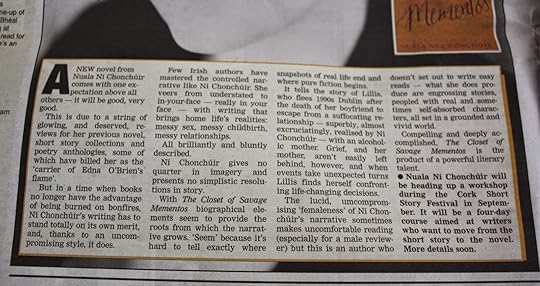 Click image to enlarge
Click image to enlarge
 Click image to enlarge
Click image to enlarge
Published on May 31, 2014 08:41
Nuala Ní Chonchúir's Blog
- Nuala Ní Chonchúir's profile
- 41 followers
Nuala Ní Chonchúir isn't a Goodreads Author
(yet),
but they
do have a blog,
so here are some recent posts imported from
their feed.


